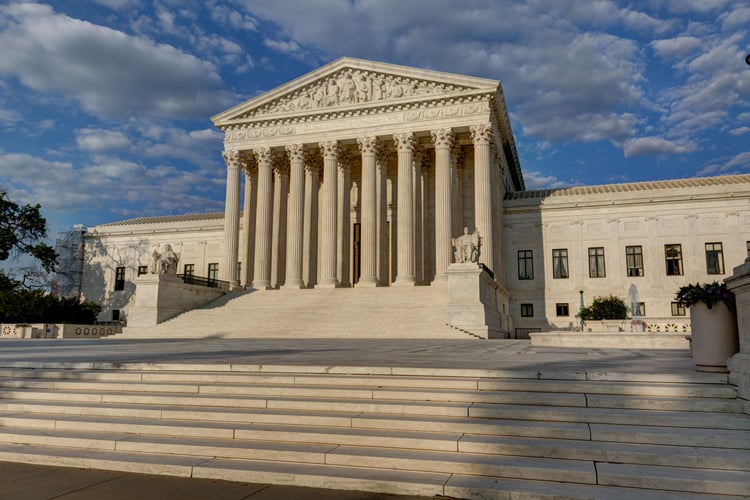Supreme Court rules mandatory union dues violate free speech rights of public employees

The U.S. Supreme Court ruled 5-4 on Wednesday that requiring public employees to pay union dues for collective bargaining violates their free speech rights under the First Amendment.
The New York Times and the Washington Post both describe the decision in Janus v. AFSCME as “a major blow” for public-sector unions.
Justice Samuel A. Alito Jr. wrote the majority opinion.
“Under Illinois law, public employees are forced to subsidize a union, even if they choose not to join and strongly object to the positions the union takes in collective bargaining and related activities,” Alito wrote. “We conclude that this arrangement violates the free speech rights of nonmembers by compelling them to subsidize private speech on matters of substantial public concern.”
Alito recognized that the loss of nonmember payments could cause unions “to experience unpleasant transition costs” and require adjustments to attract members. But those disadvantages have to be weighed against “the considerable windfall” unions have received through forced dues, Alito said.
The court ruled in a challenge by Illinois employee Mark Janus, who isn’t a union member and objected to paying mandatory fees for collective bargaining. The Supreme Court accepted the case after splitting 4-4 in March 2016 in a different case raising the same issue.
The U.S. Justice Department switched a previous stance when it sided with Janus in an amicus brief. The department said its previous position gave insufficient weight to the First Amendment interest of employees.
Janus had to pay 78.06 percent of full union dues to cover collective bargaining, lobbying, social and recreational activities, advertising, membership meetings, litigation and other services that could benefit members of the union’s collective bargaining unit. He had contended that all the fees he paid were coerced political speech.
Janus sought to overturn the 1977 Supreme Court decision Abood v. Detroit Board of Education. The case held that public employees may be required to pay mandatory fees to unions for collective bargaining, but not for political or ideological activity.
The Supreme Court agreed to overrule the decision. “We recognize the importance of following precedent unless there are strong reasons for not doing so,” Alito wrote. “But there are very strong reasons in this case. Fundamental free speech rights are at stake. Abood was poorly reasoned. It has led to practical problems and abuse. It is inconsistent with other First Amendment cases and has been undermined by more recent decisions.”
Abood had warned of the “risk of ‘free riders’” to justify fees for collective bargaining. Janus had objected to the label. “He argues that he is not a free rider on a bus headed for a destination that he wishes to reach but is more like a person shanghaied for an unwanted voyage,” Alito wrote. “Whichever description fits the majority of public employees who would not subsidize a union if given the option, avoiding free riders is not a compelling interest.”
Alito’s opinion was joined by Chief Justice John G. Roberts Jr. and Justices Anthony M. Kennedy, Clarence Thomas and Neil Gorsuch.
Justices Elena Kagan and Sonia Sotomayor wrote separate dissents. Sotomayor also joined Kagan’s dissent, along with Justices Ruth Bader Ginsburg and Stephen G. Breyer.
Kagan said the court’s decision will have “large-scale consequences” that will alter the relationships of public employees and employers “in both predictable and wholly unexpected ways.”
“There is no sugarcoating today’s opinion,” Kagan wrote. “The majority overthrows a decision entrenched in this nation’s law—and in its economic life—for over 40 years.”
Kagan said the majority overruled Abood “for no exceptional or special reason, but because it never liked the decision. It has overruled Abood because it wanted to.” The majority, she said, is “weaponizing the First Amendment” and turning it into a sword “in a way that unleashes judges, now and in the future, to intervene in economic and regulatory policy.”
As an example of the Supreme Court turning the First Amendment into a sword, Kagan cited the Supreme Court’s decision on Tuesday that found a state law requiring notices at crisis pregnancy centers likely violated the First Amendment.
“So the majority’s road runs long,” she wrote. “And at every stop are black-robed rulers overriding citizens’ choices. The First Amendment was meant for better things. It was meant not to undermine but to protect democratic governance—including over the role of public-sector unions.”
Hat tip to SCOTUSblog, which had early coverage of the opinion.
Related articles:
ABAJournal.com: “Chemerinsky: Free speech at the Supreme Court”
ABAJournal.com: “Gorsuch asks no questions in oral arguments on mandatory union fees for government workers”
ABAJournal.com: “Justice Department reverses course and urges Supreme Court to overrule pro-union precedent”
ABAJournal.com: “Supreme Court accepts new challenge to mandatory collective bargaining fees for public employees”



